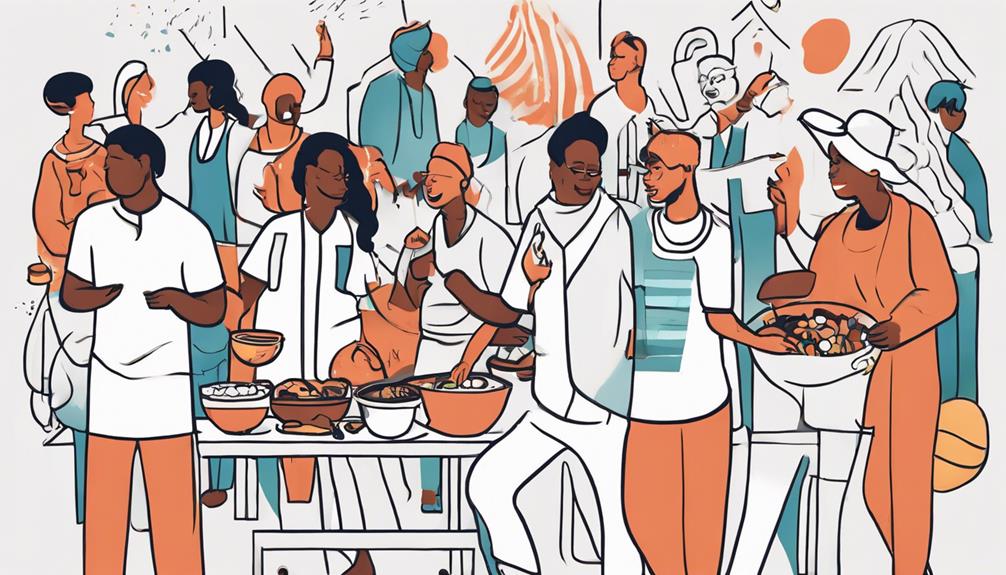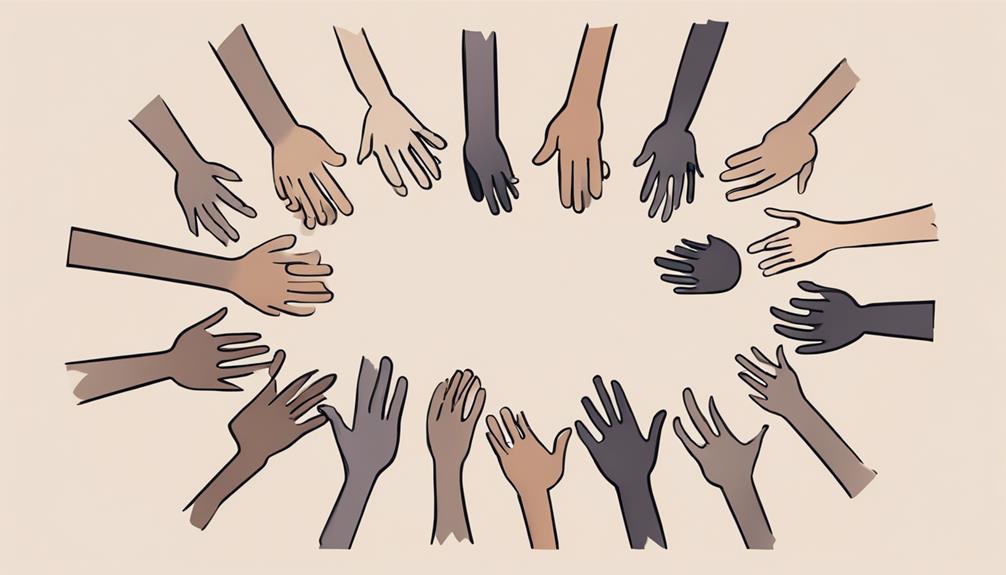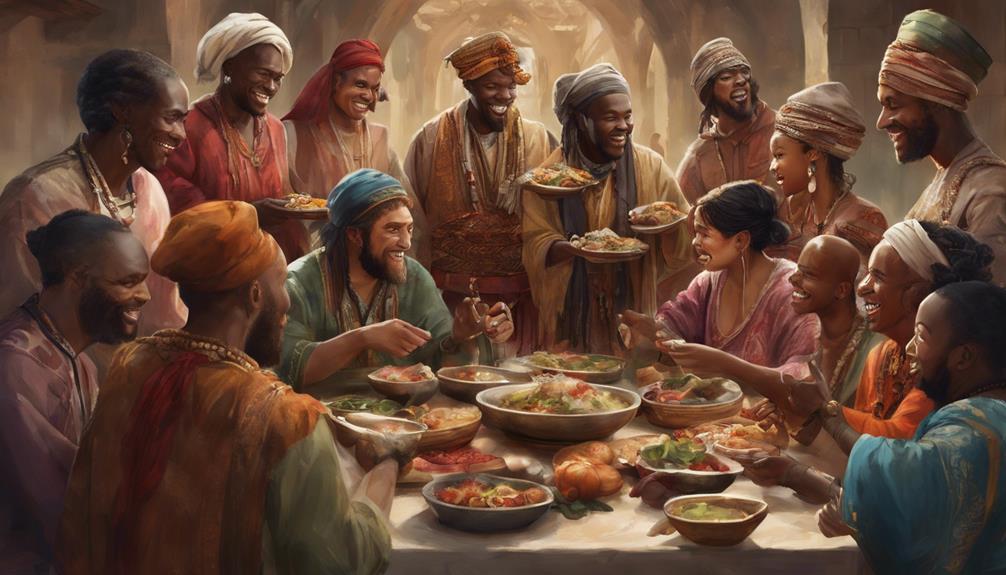Respecting other cultures is a fundamental aspect of fostering a harmonious and interconnected global community. By acknowledging and appreciating the diversity of cultural practices, beliefs, and traditions, we not only enrich our own perspectives but also cultivate empathy and understanding towards others. This paves the way for building bridges across cultures, breaking down barriers, and promoting inclusivity. Understanding the importance of respecting other cultures is crucial for creating a world where every individual feels valued and respected, contributing to a more cohesive and tolerant society.
Key Takeaways
- Respecting other cultures fosters unity, promotes empathy, and enhances global cooperation.
- Cultural understanding prevents conflicts, nurtures creativity, and enriches societal experiences.
- Embracing diversity challenges stereotypes, breaks biases, and fosters mutual respect.
- Building cultural awareness cultivates harmonious societies, fosters personal growth, and promotes inclusivity.
Understanding Cultural Diversity

Understanding cultural diversity is an intricate process that involves delving into the complexities of various societal norms, values, and traditions across different regions. In a world encompassing approximately 190 countries and 7 billion people, cultural diversity forms a rich tapestry of identities and behaviors. Interacting with diverse races, ethnic groups, and cultures has become common in our interconnected world. Integration and assimilation of cultural diversity are crucial for societal growth and mutual understanding. Respecting diverse cultures is not only about accepting differences but also about acknowledging the contributions each culture brings to the global community. Embracing different cultures enriches life experiences and promotes inclusivity across races, ethnicities, religions, and sexual orientations. Understanding and respecting diverse cultures fosters personal growth, enhances global awareness, and contributes to building a more harmonious society. By valuing and learning from diverse cultural perspectives, individuals can broaden their horizons and cultivate a deeper appreciation for the world's multifaceted tapestry of traditions and values.
Building Interpersonal Connections
Fostering interpersonal connections through cultural respect is essential for promoting empathy, understanding, and collaboration within diverse communities. By acknowledging and appreciating cultural norms, individuals can engage in meaningful intercultural communication that bridges differences and encourages the exchange of diverse perspectives. This mutual understanding serves as a foundation for building strong relationships based on respect and empathy.
Valuing cultural diversity in interpersonal interactions creates a harmonious environment where individuals feel accepted and understood, leading to reduced conflicts and increased unity among different groups. Through respectful engagement with other cultures, individuals have the opportunity to learn, grow, and gain a deeper appreciation for the richness of diverse perspectives.
Ultimately, building interpersonal connections through cultural respect nurtures a sense of belonging, acceptance, and shared humanity in global society. It paves the way for collaborative efforts, teamwork, and inclusive environments that benefit from the wealth of experiences and insights that diverse cultures bring to the table.
Enhancing Communication Skills

Enhancing communication skills through cultural sensitivity involves understanding the nuances of verbal and nonverbal cues across different cultures. By recognizing these subtleties, individuals can navigate conversations more effectively, fostering mutual understanding and respect. This heightened awareness contributes to building stronger interpersonal connections and promoting inclusivity within diverse communities.
Cultural Sensitivity in Communication
Cultural sensitivity in communication is fundamental for effective cross-cultural interactions. Understanding cultural nuances can prevent misunderstandings and conflicts by fostering respect and understanding. Here are key points to consider:
- Enhanced Empathy: Cultural sensitivity enhances empathy, allowing individuals to connect on a deeper level.
- Stronger Relationships: Being culturally sensitive in communication strengthens relationships by showing respect and appreciation for different perspectives.
- Language Barriers: Learning core words and phrases in different languages is essential to overcome language barriers and facilitate effective communication.
- Cultural Awareness: Developing cultural awareness in communication skills leads to better collaboration and understanding, fostering a more inclusive and harmonious environment.
Understanding Nonverbal Cues
Understanding nonverbal cues is imperative for effective cross-cultural communication as it plays a significant role in conveying messages and interpreting interactions accurately. Nonverbal cues, such as gestures, facial expressions, posture, and eye contact, vary across cultures and can lead to misunderstandings if not interpreted correctly. To enhance communication skills in a cultural context, it is crucial to be aware of these differences. The table below illustrates the importance of understanding nonverbal cues in cross-cultural communication:
| Importance of Understanding Nonverbal Cues |
|---|
| Prevents Misunderstandings |
| Enhances Cross-cultural Communication |
| Builds Stronger Relationships |
| Navigates Cultural Differences |
| Fosters Effective Communication |
Fostering Mutual Understanding and Respect
Fostering mutual understanding and respect among different cultures is essential for creating a cohesive and interconnected global community. By building cultural empathy, encouraging open dialogue, and embracing diversity in society, individuals can bridge gaps and promote harmony. This approach not only enhances cross-cultural communication but also cultivates a more inclusive and tolerant environment where diverse perspectives are valued.
Building Cultural Empathy
The cultivation of empathy towards different cultures is a foundational element in promoting mutual respect and understanding among individuals from diverse backgrounds.
- Developing cultural empathy fosters mutual understanding and respect.
- Cultivating cultural empathy promotes open-mindedness and acceptance of diverse perspectives and traditions.
- Understanding and respecting other cultures can lead to stronger interpersonal relationships and more harmonious communities.
- Building cultural empathy helps break down stereotypes and biases, creating a more inclusive and tolerant society.
Cultural empathy encourages individuals to actively engage with and learn from diverse cultures, enriching their own perspectives and experiences. By fostering empathy towards different cultures, individuals can build bridges, foster inclusivity, and create a more harmonious society where mutual respect and understanding thrive.
Encouraging Open Dialogue
One effective strategy for promoting mutual understanding and respect across diverse cultures is by facilitating open and constructive dialogue. Encouraging open dialogue allows individuals from different cultural backgrounds to share their perspectives, beliefs, and experiences. Through this exchange, mutual understanding can be cultivated, leading to increased cultural appreciation and empathy. Listening to diverse viewpoints enables people to broaden their horizons, challenge stereotypes, and develop a more inclusive mindset. Embracing diverse perspectives through open dialogue not only enriches personal growth and awareness but also fosters a more tolerant and cohesive society. By engaging in conversations with individuals from various cultures, we can reduce prejudice, strengthen community bonds, and work towards building a harmonious and respectful global community.
Embracing Diversity in Society
Cultural diversity in society plays a pivotal role in nurturing mutual understanding and respect among individuals from varied backgrounds.
- Embracing different cultures enhances learning opportunities and broadens perspectives.
- Understanding diverse cultures can positively impact mental health and well-being.
- Learning from varied cultural practices fosters creativity and innovation within communities.
- Embracing diversity in society promotes a sense of unity and collaboration towards common goals.
Promoting Global Citizenship
Promoting global citizenship through the lens of cultural respect is vital for fostering a sense of shared humanity and interconnectedness. Interacting with different cultures allows individuals to gain valuable insights into cultural differences, promoting empathy and understanding. This, in turn, cultivates an appreciation for human diversity, leading to a more inclusive and tolerant society on a global scale.
To further illustrate the importance of promoting global citizenship, consider the following table:
| Benefits of Promoting Global Citizenship through Cultural Respect | ||
|---|---|---|
| Fosters empathy and understanding | Encourages cooperation | Promotes inclusivity |
| Cultivates appreciation for human diversity | Builds tolerance | Enhances cultural awareness |
| Strengthens interconnectedness | Creates a sense of shared humanity | Contributes to a peaceful world community |
Breaking Down Stereotypes

Stereotypes, prevalent in society, often distort and oversimplify the complexities of diverse cultural groups, perpetuating misconceptions and hindering authentic understanding.
- Misrepresentation: Stereotypes can misrepresent the values, beliefs, and behaviors of people from different cultures.
- Prejudice and Discrimination: They can lead to prejudice, discrimination, and harmful generalizations, impacting social interactions.
- Promoting Understanding: Breaking stereotypes promotes understanding, empathy, and cultural appreciation among individuals.
- Dismantling Bias: Respecting other cultures helps dismantle harmful assumptions and biases, fostering inclusivity and respect.
Understanding cultural differences is crucial, especially in fields like Patient Care, where effective communication and respect for diverse backgrounds are essential. Addressing racial and ethnic stereotypes is paramount in creating a more harmonious society where individuals are valued for their unique identities rather than being confined by inaccurate assumptions. By challenging stereotypes, we pave the way for meaningful and respectful interactions that transcend cultural barriers.
Encouraging Cultural Exchange
Encouraging cross-cultural interactions enhances global understanding and fosters mutual appreciation among diverse communities. Cultural exchange plays a crucial role in bridging gaps between different societies by facilitating interactions that allow individuals to learn about other cultures. By interacting with different cultures, people gain valuable insights into diverse perspectives, traditions, and practices, leading to a more enriched understanding of the world around them. This exposure not only broadens horizons but also nurtures empathy, respect, and tolerance towards individuals from various backgrounds.
Engaging in cultural exchange has a positive impact on society by breaking down stereotypes and promoting interconnectedness. It enables the building of bridges that connect people from different parts of the world, fostering a harmonious coexistence. Through these exchanges, individuals can challenge preconceived notions, celebrate diversity, and cultivate a sense of unity amidst differences. Ultimately, embracing cultural exchange cultivates a more inclusive, understanding, and interconnected global community.
Embracing Differences for Growth

Embracing cultural diversity is essential for fostering personal growth, empathy, and open-mindedness in individuals and societies alike.
- Broadened Perspectives: Exposure to different cultures allows individuals to see the world from various angles, challenging their preconceptions and expanding their worldview.
- Enhanced Interpersonal Skills: Embracing cultural differences cultivates empathy by encouraging individuals to understand and relate to others who may have different backgrounds or beliefs.
- Promotion of Creativity: Diversity sparks creativity and innovation as individuals draw inspiration from a wide range of cultural practices, arts, and traditions.
- Development of Global Citizenship: Embracing differences nurtures a sense of global citizenship, fostering a mindset that values inclusivity, cooperation, and mutual respect on a worldwide scale.
Creating Inclusive and Welcoming Societies
Cultural respect and understanding play a pivotal role in shaping inclusive and welcoming societies, fostering unity and cooperation among individuals of diverse backgrounds. Learning about different cultures opens up avenues for human connection and empathy, breaking down barriers that may exist due to lack of awareness or misconceptions. Making eye contact, a common gesture in some cultures, signifies attentiveness and respect, while in others, it may be considered confrontational. By understanding these nuances, individuals can navigate interactions more effectively, showing regard for different cultural norms. Embracing diversity in societies enriches the tapestry of traditions and perspectives, creating a vibrant and inclusive environment where all members feel valued and respected. Through mutual respect and acceptance of different cultural practices, societies can cultivate a sense of belonging and unity, fostering a harmonious coexistence that celebrates the richness of human heritage.
| Importance of Cultural Respect | Benefits of Understanding Different Cultures | Promoting Inclusivity |
|---|---|---|
| Fosters unity and cooperation | Enriches perspectives and traditions | Enhances social cohesion |
| Reduces prejudice | Creates a welcoming environment for all | Preserves cultural heritage |
Frequently Asked Questions
Why Is Respecting Others Culture Important?
Respecting others' culture is vital for promoting understanding differences and fostering empathy. It enables individuals to appreciate diverse perspectives and traditions, leading to a more inclusive and harmonious society. Embracing cultural respect ensures the preservation of unique heritage and practices, enriching the fabric of global diversity. By valuing and respecting other cultures, we contribute to a more interconnected world that celebrates the richness of human expression and fosters a sense of unity amidst diversity.
Why Is It Important to Acknowledge Other Cultures?
Cultural awareness fosters cross-cultural communication, enhancing societal cohesion. Acknowledging other cultures promotes cultural sensitivity and appreciation, crucial for global interconnectedness. Understanding diverse traditions enriches perspectives and fosters inclusivity. Embracing cultural differences contributes to personal growth and empathy, strengthening relationships. By valuing cultural diversity, individuals can engage in meaningful dialogue, reduce prejudice, and preserve the rich tapestry of global heritage.
Why Is It Important to Support and Respect Diversity and Different Cultures?
Promoting unity, fostering understanding, celebrating differences, and embracing diversity are imperative for cultivating a harmonious and inclusive society. By valuing diverse cultures, we enrich our perspectives, enhance cross-cultural communication, and contribute to a vibrant community. Embracing cultural diversity not only reduces prejudice and discrimination but also fosters personal growth and strengthens social bonds. Supporting and respecting different cultures are foundational for building a world that is interconnected, peaceful, and accepting.
Why Is It Important to Value Other Cultures?
Cultural appreciation and awareness are fundamental for fostering intercultural communication and sensitivity. Understanding and valuing other cultures lead to cross-cultural understanding and global unity. Ethnocultural respect and cultural exchange enrich perspectives and promote inclusivity in a diverse society. Embracing diverse cultures contributes to a harmonious and interconnected global community. Appreciating the richness of various traditions and heritage enhances relationships and promotes a more tolerant and interconnected world.
Conclusion
In conclusion, the importance of respecting other cultures cannot be overstated. By understanding and valuing cultural diversity, building interpersonal connections, and fostering mutual understanding, we contribute to a more inclusive and interconnected world. Embracing differences and breaking down stereotypes not only enriches our perspectives but also promotes global citizenship. Through cultural exchange and creating inclusive societies, we can cultivate a sense of unity and respect for all individuals, leading to a more harmonious and accepting world.
